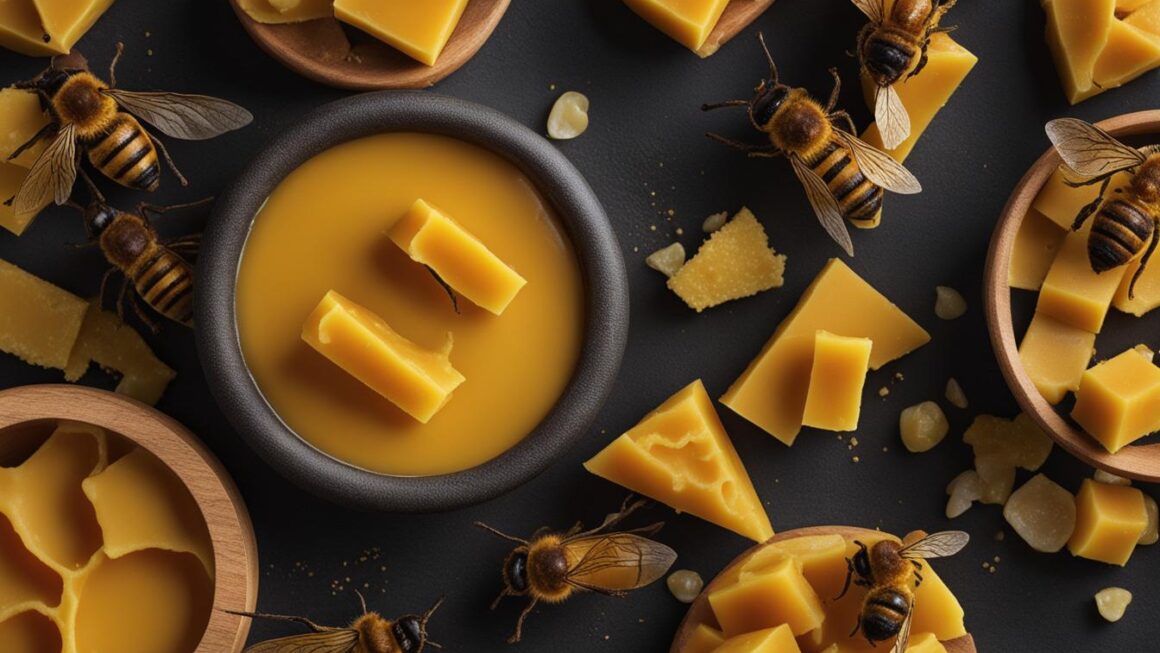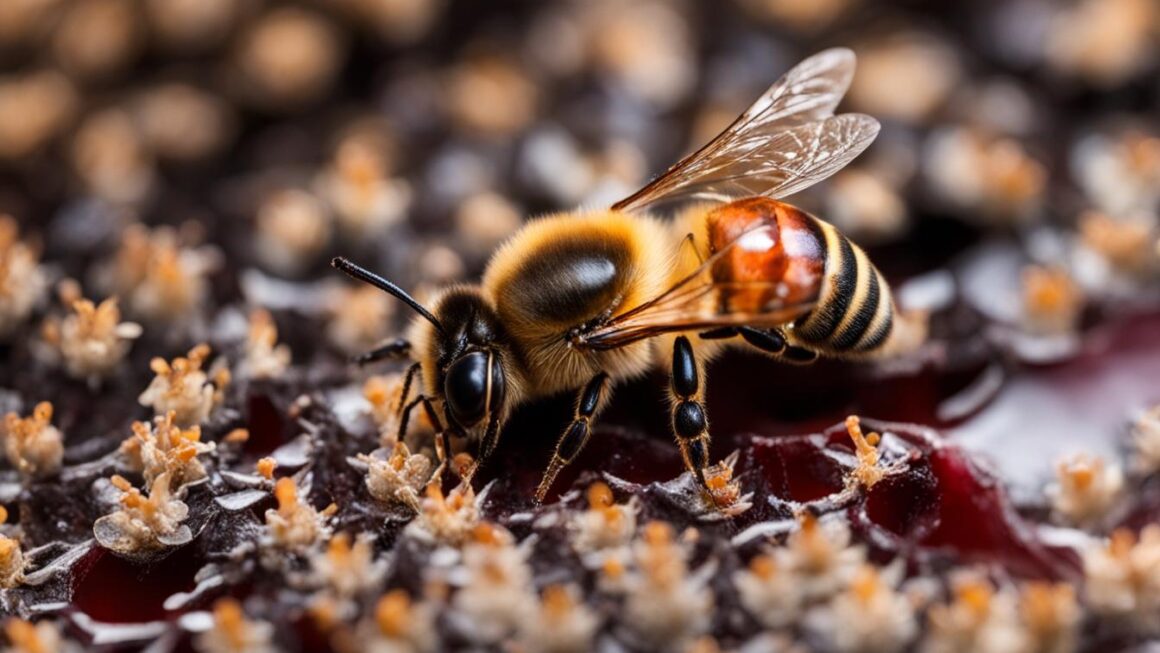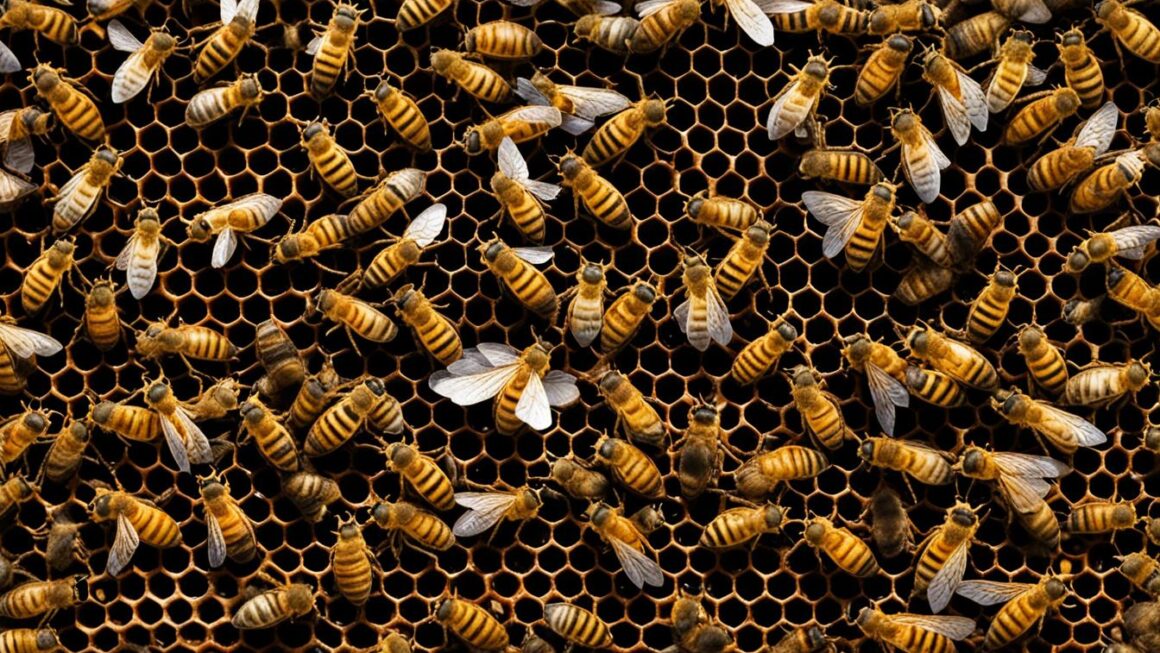Beeswax is a natural product made by honey bees and has been used for various purposes for centuries. It is commonly used in cosmetics, skincare, and even in the food industry. However, there is a growing interest in its potential health benefits, leading some individuals to consider ingesting it. In this section, we will explore the question of whether swallowing beeswax is safe, discuss its composition and various uses, and evaluate any potential risks and benefits associated with its consumption.
Key Takeaways:
- Beeswax is a natural product made by honey bees.
- It is commonly used in cosmetics, skincare, and even in the food industry.
- Swallowing food-grade beeswax in moderate amounts is generally considered safe.
- Individual sensitivities and impurities in the beeswax can affect its safety.
- Consulting with a healthcare professional is advisable before consuming beeswax regularly.
Understanding Beeswax Composition and Uses
Beeswax is a natural substance produced by honeybees and is widely used in many industries, including cosmetics, food, and medicine. Its unique properties make it a versatile and useful material in various applications.
Composition
Beeswax is a complex mixture of various compounds, including esters, hydrocarbons, and fatty acids. Its composition varies depending on the location of the beehive and the flowers the bees have visited. However, beeswax is generally considered safe for consumption when it is free of impurities and contaminants.
Uses
Beeswax has many uses in different industries. In the food industry, it is often used as a natural food preservative or as a coating for fresh produce to prolong its shelf life. It is also present in many cosmetic products, such as lip balms and moisturizers, due to its emollient and moisturizing properties. Additionally, beeswax is used as a natural adhesive in woodworking and in the production of candles.
When considering beeswax ingestion, it is essential to understand its composition and uses to determine the potential impact it may have on one’s health.
“Beeswax is a complex mixture of various compounds, including esters, hydrocarbons, and fatty acids.”
Can Beeswax Be Ingested?
Swallowing beeswax is a relatively uncommon practice, but some individuals may be curious about its safety and potential effects. However, it is essential to determine whether beeswax can be safely ingested before considering its consumption.
Can you swallow beeswax? While beeswax is not intended for consumption, it is generally safe for ingestion if it is pure, food-grade beeswax. However, it is important to note that beeswax candles or other beeswax products may contain additives or impurities that could pose potential risks.
What are the dangers of swallowing beeswax? Swallowing non-food-grade beeswax or beeswax products may lead to adverse effects such as digestive issues, including constipation or bowel obstruction. Additionally, some individuals may be allergic to beeswax, leading to more severe symptoms such as anaphylaxis.
The Importance of Purity
When considering the safety of ingesting beeswax, purity is a critical factor. Pure, food-grade beeswax is generally safe for consumption and is often used as a natural sweetener or to add texture to foods. However, beeswax products that are not intended for ingestion, such as candles or cosmetics, may contain impurities or additives that could pose potential risks.
To ensure the beeswax is safe for consumption, it is essential to purchase from a reputable source and verify that it is labeled as food-grade. Additionally, it is essential to avoid consuming beeswax products that are not intended for ingestion, such as candles or cosmetic items.
Individual Sensitivities and Interactions
While pure, food-grade beeswax is generally safe for ingestion, some individuals may have sensitivity or allergic reactions to beeswax. Common symptoms of a beeswax allergy include hives, itching, and swelling. In severe cases, anaphylaxis may occur, which can be life-threatening.
It is also essential to consider any potential interactions between beeswax and other substances. For example, individuals taking certain medications or with underlying health conditions may be at higher risk of adverse effects from ingesting beeswax.
Conclusion
While ingesting beeswax is not a common practice, it is generally safe when consumed in pure, food-grade form. However, it is crucial to consider factors such as purity, individual sensitivities, and potential interactions when determining whether it is safe to swallow beeswax. Consult with a healthcare professional if you have any concerns about consuming beeswax regularly.
Safety of Swallowing Beeswax
Swallowing beeswax is generally considered safe for most individuals when consumed in moderation and in its pure, food-grade form. However, as with any substance, there are potential risks to be aware of.
One concern is the possibility of choking on beeswax, particularly if it is consumed in large chunks. To prevent this, beeswax should be grated, shaved, or melted before consumption.
Another issue is the purity of the beeswax. Some beeswax products may contain impurities or additives that could be harmful if ingested. It is crucial to ensure that any beeswax intended for consumption is labeled as food-grade and obtained from a reputable source.
Individual sensitivities may also play a role in the safety of swallowing beeswax. Some individuals may be allergic to bees or bee products, including beeswax, and should avoid consuming it. Additionally, those with digestive issues or conditions should exercise caution when consuming beeswax, as it may exacerbate their symptoms.
Overall, while beeswax is generally safe for consumption, it is always best to consult with a healthcare professional before making any significant changes to your diet or consuming beeswax regularly.
Potential Risks of Swallowing Beeswax
While beeswax is generally considered safe for consumption in small amounts, there are still some potential risks to be aware of.
Allergic Reactions
One of the most significant risks associated with swallowing beeswax is an allergic reaction. For those who are allergic to bees or bee products, ingesting beeswax can cause severe symptoms such as hives, difficulty breathing, and even anaphylaxis. It is essential to consult with an allergist before consuming beeswax if you have any history of bee allergies.
Choking Hazard
Swallowing a large piece of beeswax can also pose a choking hazard, particularly for young children, the elderly, or individuals with difficulty swallowing. It is crucial to cut beeswax into small pieces or grate it finely before consuming it to avoid this risk.
Contaminants
Beeswax may contain contaminants such as pesticides, heavy metals, or bacteria that can pose health risks if swallowed. Purchasing food-grade beeswax from a reputable source and properly storing it can help reduce the risk of contamination.
It is essential to be aware of these potential risks before consuming beeswax. If you experience any adverse reactions after ingesting beeswax, seek medical attention immediately.
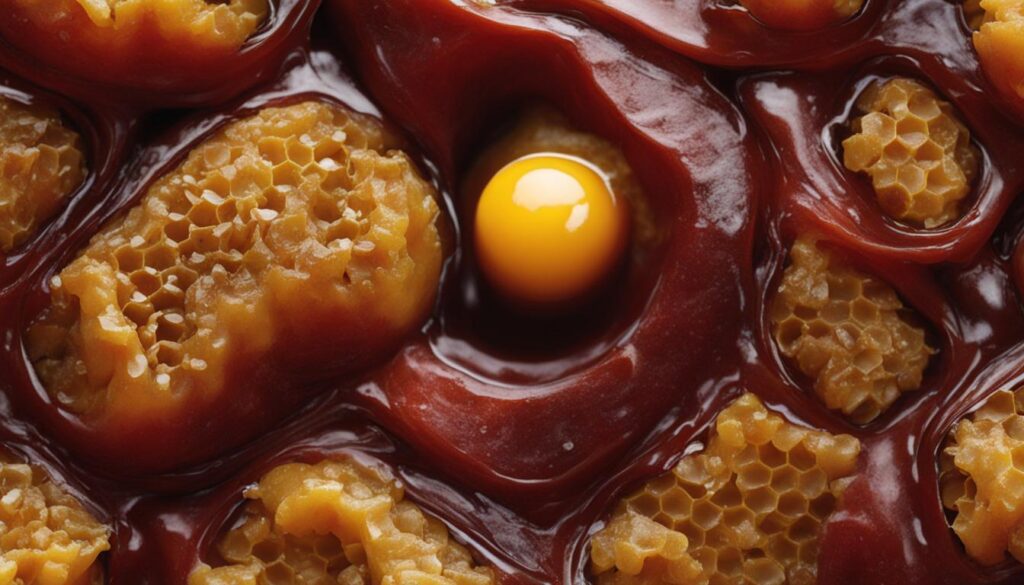
Benefits of Swallowing Beeswax
Swallowing beeswax has been associated with several reported benefits.
1. Soothes Sore Throats: Beeswax has natural anti-inflammatory and antibacterial properties that can help soothe a sore throat. When ingested, it forms a protective barrier in the throat that can reduce irritation and inflammation.
2. Promotes Digestive Health: Beeswax contains small amounts of vitamin A, which is essential for maintaining healthy digestion. It also has emulsifying properties that can help break down fats in the digestive system.
3. Relieves Stress and Anxiety: Some individuals believe that swallowing beeswax can promote relaxation and relieve symptoms of stress and anxiety.
4. Improves Skin Health: Beeswax has been used for centuries in topical applications to nourish and moisturize the skin. When ingested, it can also provide similar benefits by promoting healthy skin from within.
While there is limited scientific research on the potential benefits of swallowing beeswax, these reported effects are generally safe and may be worth exploring for some individuals. However, it is always important to consult with a healthcare professional before consuming beeswax regularly, especially if you have any underlying health conditions.
Factors Influencing Beeswax Safety
When considering whether beeswax is safe to ingest, several factors must be taken into account. While beeswax is generally considered non-toxic, individual sensitivities, impurities, and other variables can affect its safety when swallowed.
Purity of Beeswax
The purity of beeswax is a critical consideration when it comes to its safety. Beeswax used for candle-making or other non-food purposes may contain impurities or additives that make it unsuitable for consumption. Food-grade beeswax, on the other hand, is specifically formulated for use in foods and is generally regarded as safe by the FDA. When shopping for beeswax, it is essential to look for products labeled as “food-grade.”
Individual Sensitivities
While rare, some individuals may have an allergy or sensitivity to beeswax. Symptoms of an allergic reaction may include hives, itching, swelling, or difficulty breathing. If you have known allergies or have experienced an adverse reaction to bees or honey products in the past, it is best to avoid consuming beeswax.
Interaction with Other Substances
Beeswax may interact with certain medications or other substances, potentially affecting their efficacy or causing adverse effects. If you are taking any prescription medications, it is advisable to consult with a healthcare professional before consuming beeswax. Additionally, some experts advise against consuming beeswax in conjunction with dairy products as the combination may cause digestive upset.
External Contaminants
Beeswax can absorb contaminants from the environment or processing methods, potentially affecting its safety. For example, beeswax sourced from areas with high levels of pollution may contain harmful chemicals or heavy metals. It is important to choose beeswax from reputable sources and ensure that it has been properly processed to minimize the risk of contamination.
Considering these factors can help you determine whether beeswax is safe for you to ingest. Consulting with a healthcare provider is always recommended before adding any new food or supplement to your diet, including beeswax.
Recommendations for Beeswax Consumption
If you are considering swallowing beeswax, it is essential to take the necessary precautions to ensure its safety. Here are some recommendations:
- Use only pure, food-grade beeswax that is free from contaminants. Avoid ingesting beeswax that is intended for use in candles or other non-food applications.
- Start with small amounts of beeswax and gradually increase the dosage as tolerated.
- Always consult with a healthcare professional if you have any underlying medical conditions or concerns about the safety of consuming beeswax.
- Be aware of potential allergic reactions, especially if you have a history of allergies to bee products.
- Store beeswax in a cool, dry place away from direct sunlight or heat sources to prevent spoilage or contamination.
While consuming beeswax in small amounts is generally safe, it is important to remember that it should not be considered a substitute for medical treatment or advice.
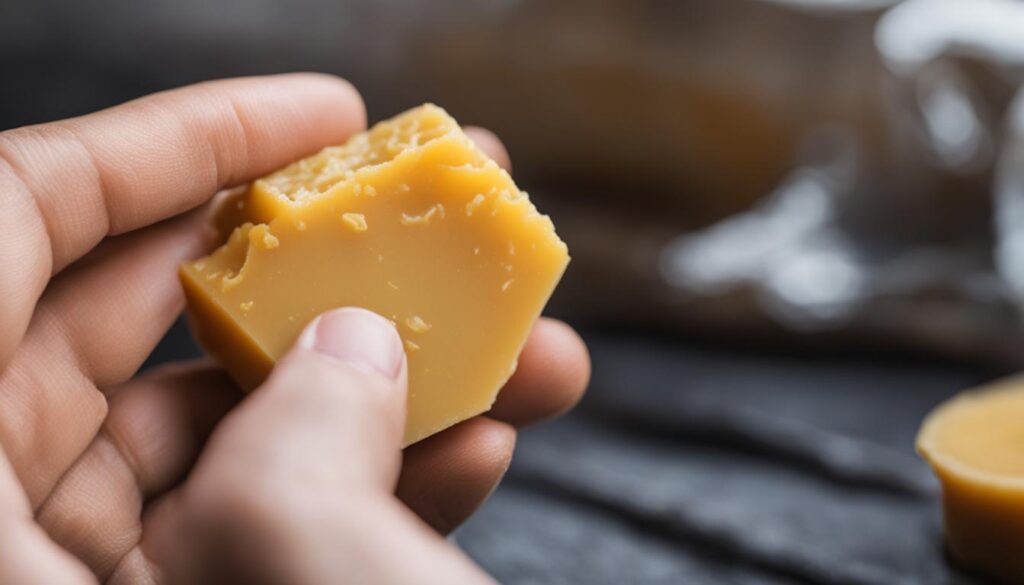
“As with any supplement or food, moderation is key. Always discuss any significant dietary changes with your healthcare provider.”
Alternatives to Swallowing Beeswax
If you are interested in the potential benefits of beeswax but are hesitant to consume it, there are alternative ways to incorporate this natural ingredient into your daily routine.
Topical Application
One popular alternative is using beeswax in topical products, such as balms, salves, and lotions. Beeswax is known for its moisturizing properties and can help soothe and protect the skin. Additionally, beeswax may have anti-inflammatory effects, making it a useful ingredient for treating conditions such as eczema and psoriasis.
When using beeswax in topical applications, it is essential to ensure that the product is made with high-quality, pure beeswax. Look for products that use food-grade beeswax and do not contain any harmful additives.
Cooking and Baking
Another way to enjoy the benefits of beeswax is by incorporating it into your cooking and baking. Beeswax can be used as a natural sweetener and can add a unique flavor to recipes such as candies and baked goods.
When using beeswax in cooking and baking, it is important to use food-grade wax and to follow recipes carefully. Beeswax should be melted before being added to recipes and should not be ingested in its solid form.
Using Beeswax Candles
Lastly, beeswax candles are a popular way to enjoy the benefits of this natural ingredient. Beeswax candles burn cleanly and emit a warm, natural glow that can create a relaxing atmosphere in any space. Additionally, beeswax candles may have air-purifying properties, making them a useful addition to any home.
When purchasing beeswax candles, look for products made with pure beeswax and avoid candles that contain harmful additives or fragrances.
In conclusion, there are several ways to enjoy the benefits of beeswax without consuming it orally. Whether using it in topical products, incorporating it into recipes, or enjoying the warm glow of a beeswax candle, this versatile ingredient can add a natural touch to your daily routine.
Conclusion
In conclusion, the question of whether swallowing beeswax is safe has been explored, and the potential risks and benefits discussed. From the evidence presented, it appears that moderate consumption of pure, food-grade beeswax is generally safe for most individuals. However, it is always wise to consult with a healthcare professional before making any significant changes to your diet or consuming beeswax regularly.
It is essential to note that while there are potential benefits to swallowing beeswax, such as soothing sore throats or improving digestion, there are also risks to consider. Some individuals may be allergic to beeswax, or it may interact with other medications, causing adverse effects. Therefore, caution should always be exercised.
Overall, beeswax is an intriguing substance with numerous uses, and it is understandable why some may consider consuming it. However, it is important to carefully consider the potential risks and benefits before doing so. Alternative ways to use beeswax, such as incorporating it into recipes or using it topically, may provide similar effects without the risks associated with ingestion.
Remember, the safety of consuming beeswax depends on various factors, such as purity, individual sensitivities, and interactions with other substances. By adhering to recommended guidelines and consulting with a healthcare professional, individuals can safely enjoy the potential benefits of beeswax.
FAQ
Is swallowing beeswax safe?
Swallowing beeswax is generally considered safe, especially when consumed in moderate amounts and if it is pure, food-grade beeswax. However, it is always advisable to consult with a healthcare professional before making any significant changes to your diet.
What are the potential risks and benefits of swallowing beeswax?
Swallowing beeswax may have potential benefits such as improving digestion and promoting gut health. However, there is limited scientific evidence to support these claims. As for risks, consuming contaminated or impure beeswax may lead to digestive discomfort or allergic reactions in some individuals.
Can beeswax be ingested?
Yes, beeswax can be safely ingested, especially if it is pure and food-grade. However, it is crucial to ensure that the beeswax is free from contaminants and suitable for consumption.
Is it safe to swallow beeswax?
Swallowing beeswax is generally considered safe, but it is essential to consider the quality and purity of the beeswax. Ensure that it is food-grade and free from any additives or contaminants that may pose a risk to your health.
What are the factors that influence the safety of swallowing beeswax?
Several factors can influence the safety of swallowing beeswax, including the purity of the beeswax, individual sensitivities or allergies, and potential interactions with medications or other substances. It is recommended to consider these factors before consuming beeswax.
Are there any alternatives to swallowing beeswax?
Yes, there are alternative ways to enjoy the potential benefits of beeswax without swallowing it. Beeswax can be used topically in skincare products or incorporated into recipes for its natural properties. These methods provide similar effects without the need for ingestion.
What are the recommendations for beeswax consumption?
When consuming beeswax, it is advisable to choose pure, food-grade beeswax from reliable sources. Start with small amounts and monitor your body’s response. If you experience any adverse effects, discontinue use and consult a healthcare professional.
Can beeswax be eaten?
Yes, beeswax can be eaten if it is pure and food-grade. However, it is important to ensure that the beeswax is free from any contaminants or additives that may impact its safety for consumption.
What are the potential risks of swallowing beeswax?
While swallowing pure, food-grade beeswax is generally safe, there are potential risks associated with consuming contaminated or impure beeswax. These may include digestive discomfort or allergic reactions in some individuals.
What are the benefits of swallowing beeswax?
Swallowing beeswax is believed to have potential benefits such as improving digestion and supporting gut health. However, scientific evidence supporting these claims is limited, and further research is needed to fully understand the effects of swallowing beeswax.

